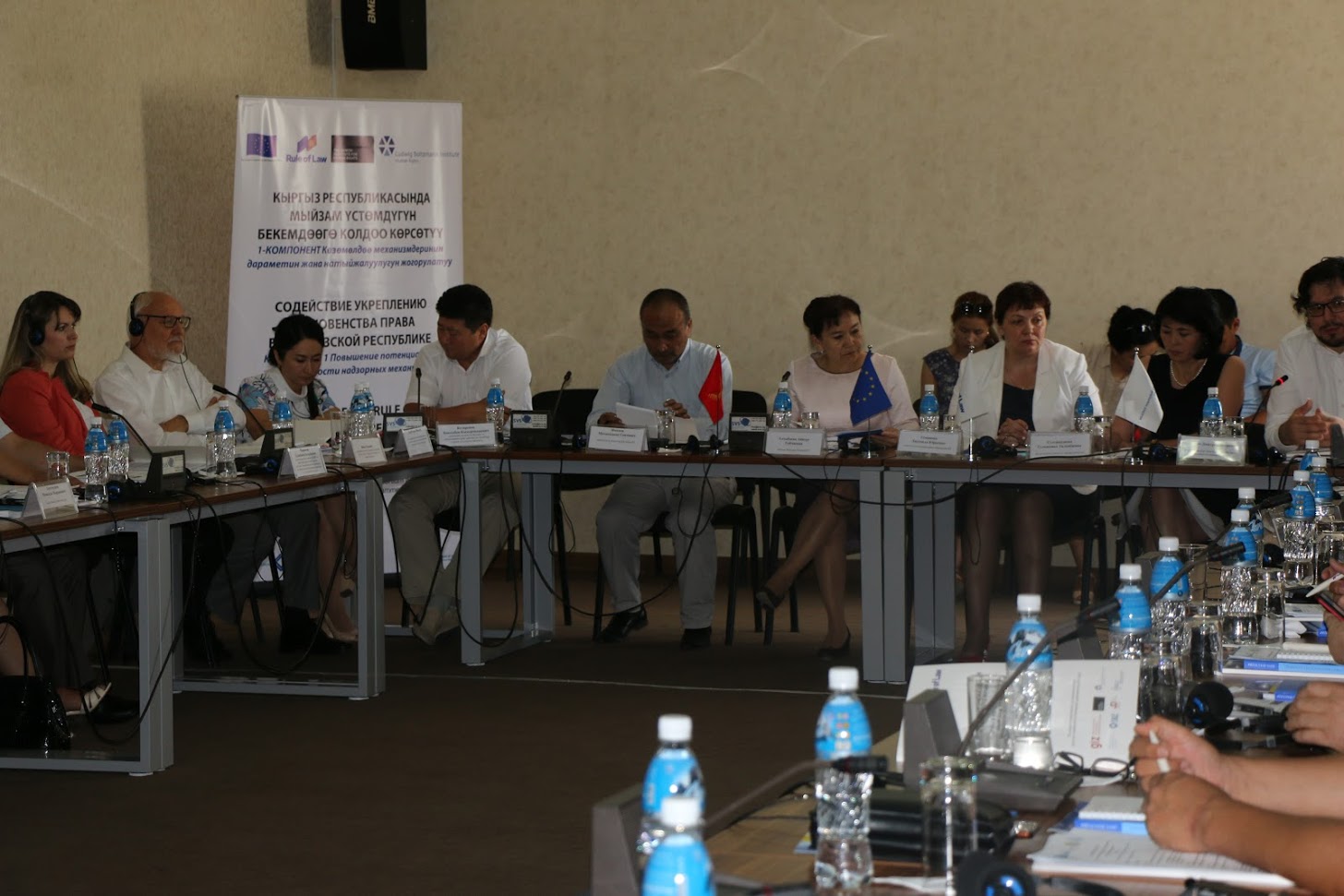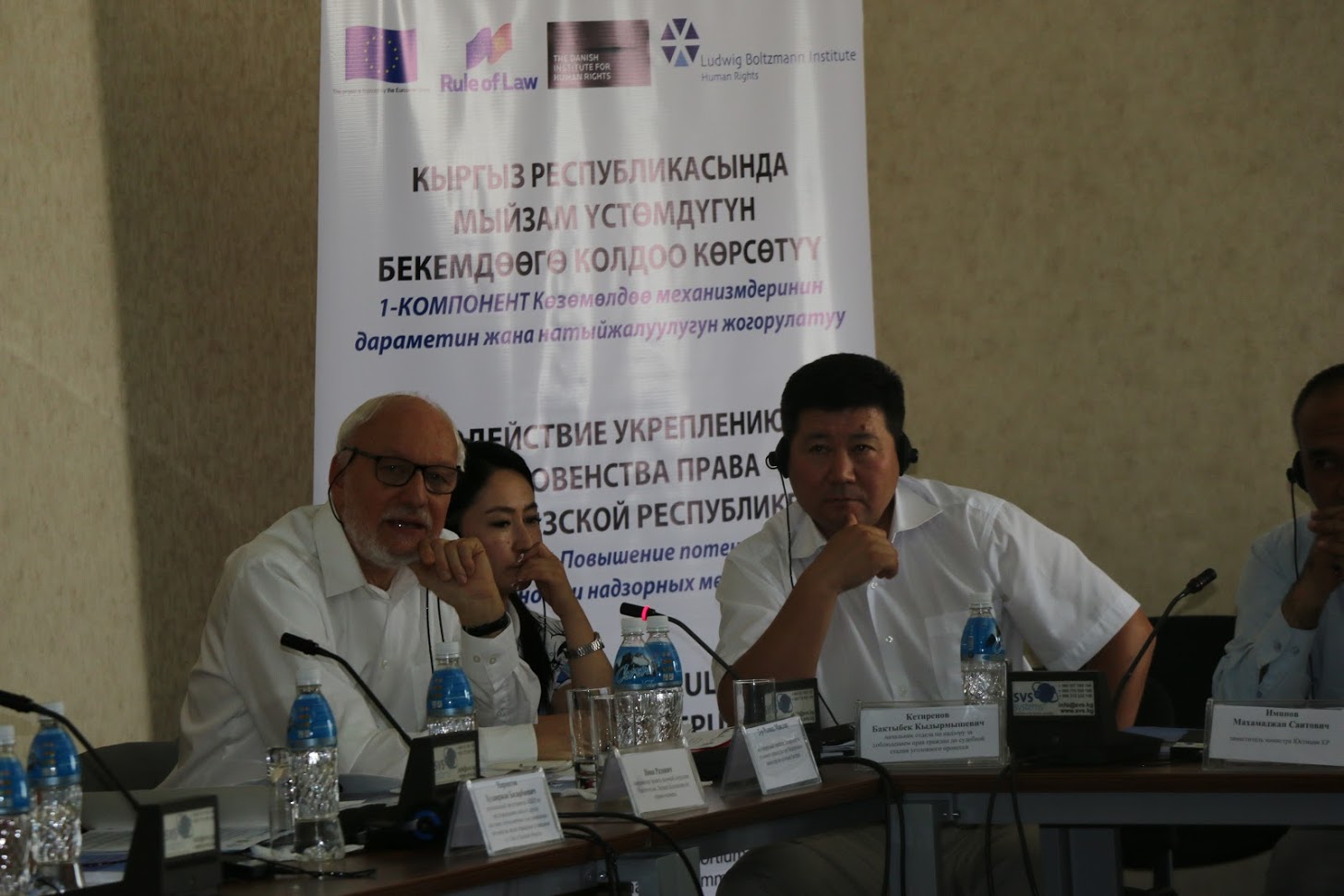Rule of Law in Kyrgyzstan – Austrian experts Roland Miklau and Nina Radović at Round Table on Torture Prevention
On 23 June 2017, the Human Rights Advisory Board in Kyrgyzstan in cooperation with the Ludwig Boltzmann Institute of Human Rights organised a round table on “Common Efforts of State Bodies and Civil Society for Torture Prevention”, which took place in Osh, Kyrgyzstan. As part of the EU Project “Promotion of Rule of Law in Kyrgyzstan”, the round table aimed at discussing obstacles related to the prevention of torture and at considering the role of state bodies and civil society actors in their efforts to respond to torture allegations not only individually, but also in a coordinated way.
After the opening addresses by Ms. Guljamal Sultanalieva, Human Rights Advisory Board, Ms. Ainuru Altybaeva, Member of Kyrgyz Parliament, Ms. Ludmila Usmanova, Kyrgyzstan’s Deputy Prosecutor General and Mr. Dmitry Nurumov, Lead Expert of the Ludwig Boltzmann Institute of Human Rights, the floor was open for a constructive dialogue. The first speakers were Mr. Mamasaly Toktomushev, Judge of Osh Regional Court, and Mr. Mahamadjan Iminov, Kyrgyzstan’s Deputy Minister of Justice, who provided an insight into the legal regulations and administration of the torture and violence prohibition in Kyrgyzstan.
This was followed by an input of Mr. Bakybek Ketirenov, Head of the Department for Human Rights Oversight in Pre-trial Criminal Proceedings. Furthermore, Mr. Roland Miklau, former Director General of the Department for Criminal Justice in the Austrian Federal Ministry of Justice, presented the work of the Austrian National Preventive Mechanism for preventing torture (NPM) and its six regional commissions and pointed out that torture is a worldwide issue which needs to be addressed. The information provided by Mr. Hudayarzhan Narmatov from the Kyrgyz NPM, the National Center of the Kyrgyz Republic for the Prevention of Torture and Other Cruel, Inhuman or Degrading Treatment, as well as the considerations of Mr. Yerlan Alimbayev, Deputy Ombudsman of Kyrgyzstan, showed that the work of these institutions needs to be independent and that unhindered access to places of detention needs to be guaranteed in order to be effective.
Another obstacle in torture prevention is corruption, a problem which needs to be tackled from all sides and at all levels, as recognised by Mr. Azat Azimov, Head of the Anti-Corruption service of the National Security Committee of Kyrgyzstan. Mr. Abdujamal Isaev, Senior Inspector at the Ministry of the Interior of Kyrgyzstan, stressed the importance of joint efforts of both, anti-torture state bodies and the civil sector. The role of civil society in torture prevention and the need for cooperation and a partnership approach was also emphasised by Ms. Nina Radović, Researcher at the Ludwig Boltzmann Institute of Human Rights. Other issues which were mentioned are impunity and the lack of convictions in cases of torture which constitute a major problem and need to be tackled. Related to this, Ms. Cholpon Omorkanova, Director of the Public Association “Egl”, underlined the importance of the interaction between civil society and the State Service for the Execution of Punishments under the Government of the Kyrgyz Republic.
Kyrgyzstan ratified the relevant international treaties for torture prevention (UNCAT ratification on 5 September 1997 and OPCAT ratification on 29 December 2008) and designated the National Center for the Prevention of Torture and Other Cruel, Inhuman or Degrading Treatment or Punishment as the NPM. Even though important steps have been achieved in this field, further common efforts are needed in order to enhance torture prevention and investigation of torture allegations in practice. The round table showed that all involved parties are willing and eager to continue their joint efforts in that regard.

